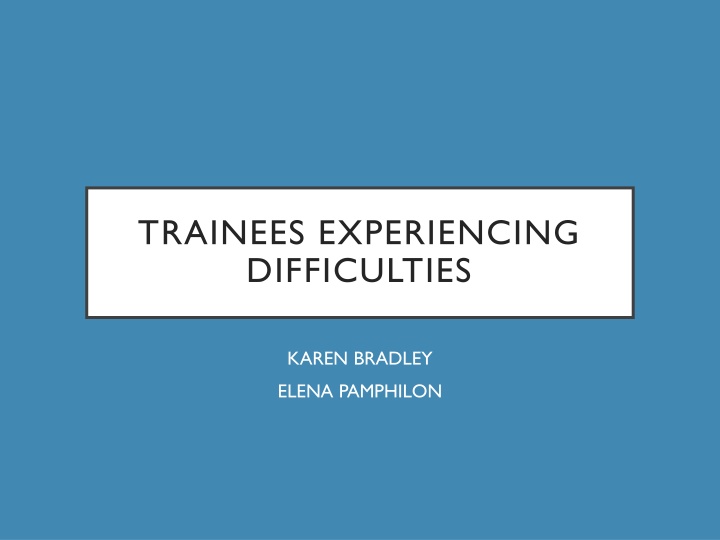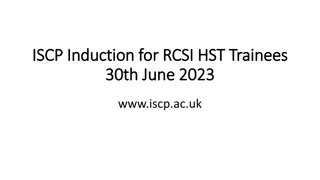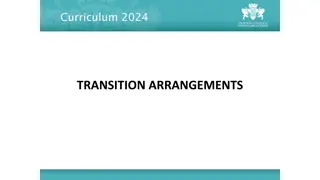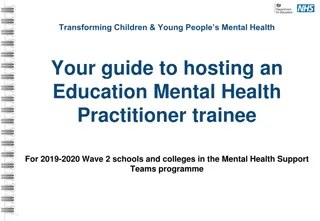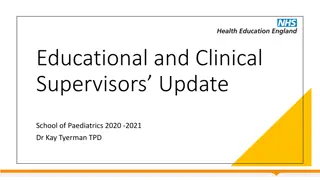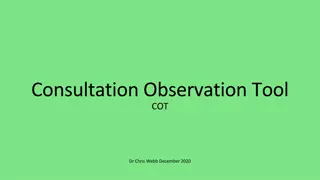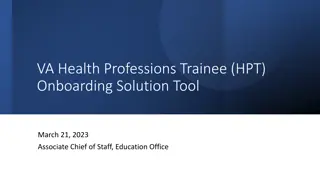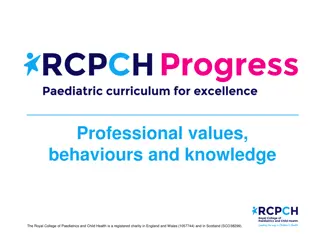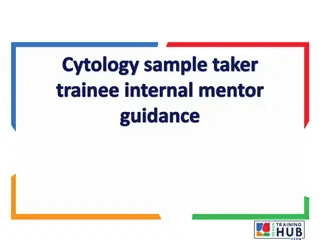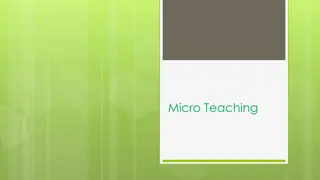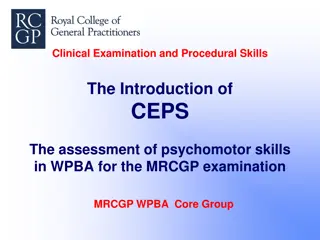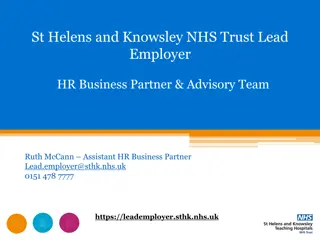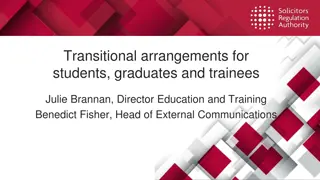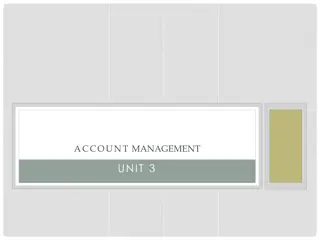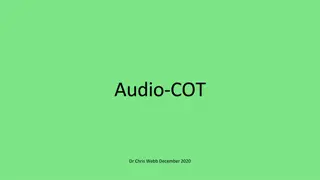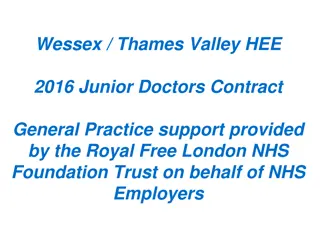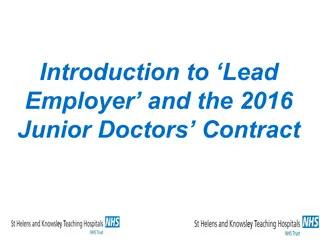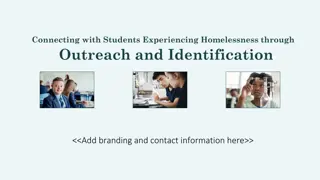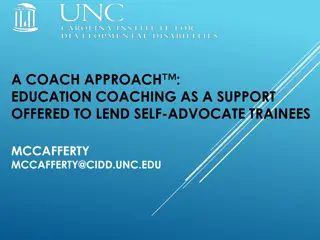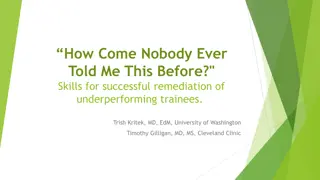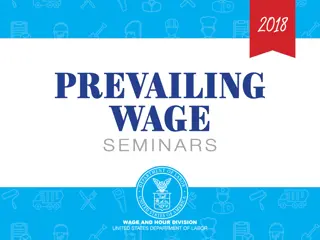Supporting Trainees Experiencing Difficulties - Identification and Strategies
Addressing trainees facing challenges encompasses early identification methods, sources, and approaches to provide necessary support. It involves navigating issues like language barriers, professional behavior concerns, and exam failures through structured assessment models and effective feedback mechanisms.
Download Presentation

Please find below an Image/Link to download the presentation.
The content on the website is provided AS IS for your information and personal use only. It may not be sold, licensed, or shared on other websites without obtaining consent from the author.If you encounter any issues during the download, it is possible that the publisher has removed the file from their server.
You are allowed to download the files provided on this website for personal or commercial use, subject to the condition that they are used lawfully. All files are the property of their respective owners.
The content on the website is provided AS IS for your information and personal use only. It may not be sold, licensed, or shared on other websites without obtaining consent from the author.
E N D
Presentation Transcript
TRAINEES EXPERIENCING DIFFICULTIES KAREN BRADLEY ELENA PAMPHILON
PLAN FOR THE SESSION -Who is a trainee in difficulty? -How to identify these trainees -How to SUPPORT them
What do you think of when we say the phrase TRAINEES EXPERIENCING DIFFICULTIES Doctor in difficulty 'Trainees in trouble'
MASLOWS HIERARCHY OF NEEDS
LANGUAGE ISSUES
HOW DO WE APPROACH TRAINEES IN DIFFICULTY?
SJT scores from application exams Admin. Behaviours (Practice and scheme) NHS naivety EARLY IDENTIFICATION SOURCES SUIs (serious untoward incidents) Other sources e.g. GMC conditions CSR and ESR MSF feedback Health / family issues
LATER IDENTIFICATION Exam failures AKT (applied knowledge test) & CSA (clinical skills assessment) / RCA (recorded consultation assessment)/SCA Ongoing CSR and ESR concerns Organisational issues importance of educators notes Professional behaviour concerns
SKIPE ASSESSMENT MODELS I-SID
SKIPE Skills Knowledge Past External Internal
Concerns from post - Debriefs, WBPAs, MSF, other feedback Concerns from Scheme / Trust / GMC etc. use SKIPE, RDMp, other sources I Identify S Share with trainee, CS, ES, Scheme, Performance team. I - SID I the trainee - plan together Involve Educator notes Be factual, non judgemental, notify the trainee that you are doing this. Add frequently, include positive and negative D Document
HAVING THE DIFFICULT CONVERSATION GIVING FEEDBACK THAT IS HEARD AND EVIDENCED RCGP concerns - trainers failing to fail Limitations of the criticism sandwich consider going carb free! Importance of using Educator notes as a 'Training Diary'
Why are you recording? for trainee, for trainer, for TPD and Performance team, for ARCP Who should be recording You, trainee, other trainers in your practice, TPD, Performance team Where should you be recording Educators notes, CSR, ESR, WPBA RECORDING EVIDENCE What would you want to record Facts, behaviours, skills, knowledge, events How would you triangulate your evidence MSF, PSQ, Other posts, Exams, if more than one trainer then 2 x CSR
EPORTFOLIO EDUCATOR NOTES EXAMPLES
ST1 IN PRACTICE We reviewed today how you have been managing telephone consulting and looked at the skills that you have been developing over the last 6 weeks. You have become increasingly more confident with this way of consulting, and have found that you have naturally become a little less doctor centred in your data gathering approach. You have been working on implementing what we covered in tutorial a few weeks ago and letting the patient tell their story at the start and listening more. You have found this much more helpful in eliciting patient expectations which you feels helps when it comes to management. This is evident when we come to debrief as there has been a clear improvement here, and has also been commented on by other GPs who have debriefed you. Well done!
ST2 IN HOSPITAL POST D contacted me to update me that she has not put as many entries on her portfolio as she would like due to a relative receiving some bad health news and having to be in hospital. She feels she is managing and doesn't need time off work but life has got a little busy as a result and therefore struggled more recently to put on entries, I reassured her I am happy with her eportfolio so far. D did not need any further input but knows I'm here if she does
ST3 You have arrived significantly late to work 4 times in the last 2 weeks resulting in your surgeries starting late/other doctors having to see your patients and missing tutorial. There appear to have been a number of reasons for this. We have discussed how you might mitigate these issues in future. You are going to aim to leave for work earlier. We will review this again in a couple of weeks.
ED NOTES DONT JUST DOCUMENT PROBLEMS! It is just as important to mention the positives!
COFFEE & COMFORT BREAK
WHEN AND HOW DO YOU GET THE SUPPORT TEAM INVOLVED?!
WHAT IS THE SUPPORT TEAM? Our aim is to support TPDs and trainers help trainees to achieve a successful CCT at the end of training; enabling them to progress to safe independent practice. We meet trainees, trainers and TPDs, run courses, signpost, troubleshoot and respond to concerns. We aim to constantly enrich what we offer, being open to ideas from other deaneries as well as our own educators, in developing our educational programmes.
Repeated or significant Exam fails AKT, CSA/RCA/SCA Scheme concerns WHO GETS REFERRED TO THE SUPPORT TEAM? Persistent non engagement with eportfolio SUIs Very early sometimes. (Is the trainee at the expected level for ST1?)
Educational Supervisor Clinical Supervisor WHO DO YOU CONTACT? Training Programme Director (performance lead) Locality SUPPORT Lead Head of Training Support Head of school
Poor knowledge Poor motivation TOP EDUCATIONAL DIFFICULTIES Unable to make decisions Poorly structured consulting
Many courses -, enhanced induction programme, Booster course Study skills for busy doctors, study skills for AKT, RCA/SCA support, Coaching sessions HOW DOES THE DEANERY SUPPORT TRAINEES? Neurodiversity screening/testing free self screening. Paid full screening if positive. One to one meetings
Workshop support from peers TPD support. SUPPORT team support. Sessions at Spring and Autumn school HOW DOES THE DEANERY SUPPORT TRAINERS? Trainer plenaries / workshops Trainer resources Enhanced training grant where applicable
CONSULTATION TOOLKIT UPDATED VERSION ON WEBSITE
Taking it at the wrong time Poorly prepared REASONS FOR FAILING AKT Poor technique Health issues/anxiety Neurodiversity /Dyslexia
Taking it at the wrong time Poorly prepared REASONS FOR FAILING CSA/RCA Timing issues Poor technique (Stamina for a 12 patient surgery SCA) Health issues/anxiety Neurodiversity /Dyslexia
NEURODIVERSITY AND AKT AKT regularly unmasks neurodiversity in high achieving doctors due to format of the exam (57 seconds per question) Neurodiversity can also create challenges in terms of organisation and planning which can be an issue in studying for AKT Free Screening and assessment available from YH Deanery provided by Genius within
AKT SUPPORT PATHWAY
RCA SUPPORT PATHWAY
LOOKING AT TRAINEES WITH EDUCATIONAL DIFFICULTIES AREA OF THE WEBSITE https://www.yorksandhumberdeanery.nhs.uk/general_practice https://www.yorksandhumberdeanery.nhs.uk/general_practice/e ducators/trainees-experiencing-difficulties
